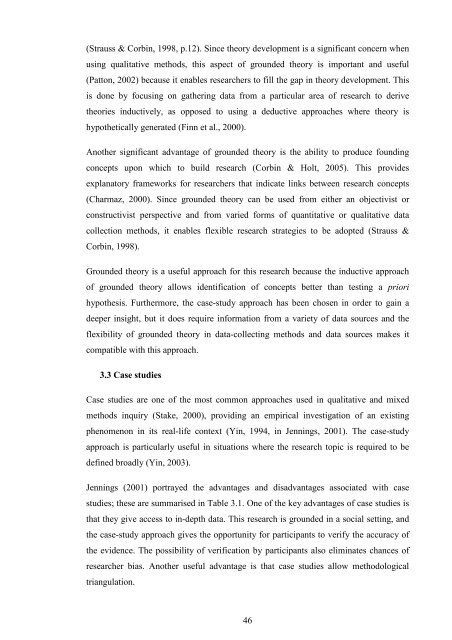The Role of Local Food in Maldives Tourism - Scholarly Commons ...
The Role of Local Food in Maldives Tourism - Scholarly Commons ...
The Role of Local Food in Maldives Tourism - Scholarly Commons ...
Create successful ePaper yourself
Turn your PDF publications into a flip-book with our unique Google optimized e-Paper software.
(Strauss & Corb<strong>in</strong>, 1998, p.12). S<strong>in</strong>ce theory development is a significant concern when<br />
us<strong>in</strong>g qualitative methods, this aspect <strong>of</strong> grounded theory is important and useful<br />
(Patton, 2002) because it enables researchers to fill the gap <strong>in</strong> theory development. This<br />
is done by focus<strong>in</strong>g on gather<strong>in</strong>g data from a particular area <strong>of</strong> research to derive<br />
theories <strong>in</strong>ductively, as opposed to us<strong>in</strong>g a deductive approaches where theory is<br />
hypothetically generated (F<strong>in</strong>n et al., 2000).<br />
Another significant advantage <strong>of</strong> grounded theory is the ability to produce found<strong>in</strong>g<br />
concepts upon which to build research (Corb<strong>in</strong> & Holt, 2005). This provides<br />
explanatory frameworks for researchers that <strong>in</strong>dicate l<strong>in</strong>ks between research concepts<br />
(Charmaz, 2000). S<strong>in</strong>ce grounded theory can be used from either an objectivist or<br />
constructivist perspective and from varied forms <strong>of</strong> quantitative or qualitative data<br />
collection methods, it enables flexible research strategies to be adopted (Strauss &<br />
Corb<strong>in</strong>, 1998).<br />
Grounded theory is a useful approach for this research because the <strong>in</strong>ductive approach<br />
<strong>of</strong> grounded theory allows identification <strong>of</strong> concepts better than test<strong>in</strong>g a priori<br />
hypothesis. Furthermore, the case-study approach has been chosen <strong>in</strong> order to ga<strong>in</strong> a<br />
deeper <strong>in</strong>sight, but it does require <strong>in</strong>formation from a variety <strong>of</strong> data sources and the<br />
flexibility <strong>of</strong> grounded theory <strong>in</strong> data-collect<strong>in</strong>g methods and data sources makes it<br />
compatible with this approach.<br />
3.3 Case studies<br />
Case studies are one <strong>of</strong> the most common approaches used <strong>in</strong> qualitative and mixed<br />
methods <strong>in</strong>quiry (Stake, 2000), provid<strong>in</strong>g an empirical <strong>in</strong>vestigation <strong>of</strong> an exist<strong>in</strong>g<br />
phenomenon <strong>in</strong> its real-life context (Y<strong>in</strong>, 1994, <strong>in</strong> Jenn<strong>in</strong>gs, 2001). <strong>The</strong> case-study<br />
approach is particularly useful <strong>in</strong> situations where the research topic is required to be<br />
def<strong>in</strong>ed broadly (Y<strong>in</strong>, 2003).<br />
Jenn<strong>in</strong>gs (2001) portrayed the advantages and disadvantages associated with case<br />
studies; these are summarised <strong>in</strong> Table 3.1. One <strong>of</strong> the key advantages <strong>of</strong> case studies is<br />
that they give access to <strong>in</strong>-depth data. This research is grounded <strong>in</strong> a social sett<strong>in</strong>g, and<br />
the case-study approach gives the opportunity for participants to verify the accuracy <strong>of</strong><br />
the evidence. <strong>The</strong> possibility <strong>of</strong> verification by participants also elim<strong>in</strong>ates chances <strong>of</strong><br />
researcher bias. Another useful advantage is that case studies allow methodological<br />
triangulation.<br />
46

















